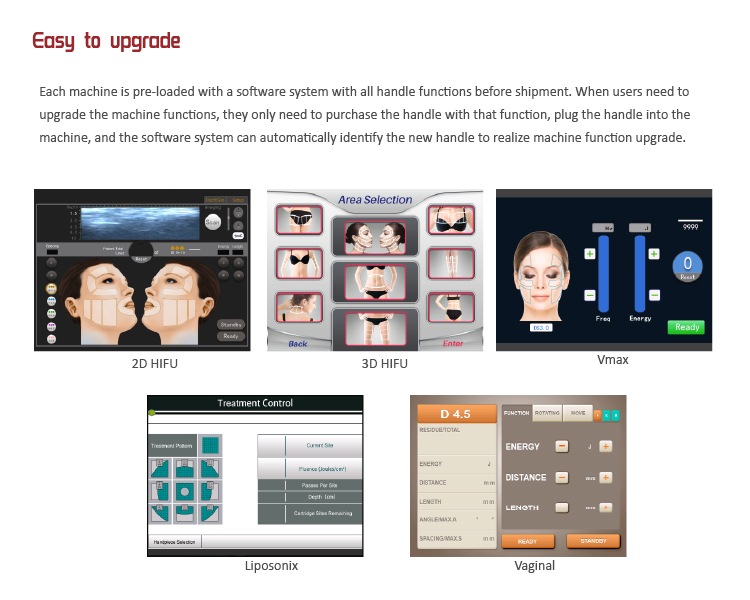HIFU Effectiveness: How This Technology is Changing Skin Care
Understanding HIFU
What is HIFU?
High-Intensity Focused Ultrasound (HIFU) signifies a groundbreaking innovation in medical and cosmetic treatment, employing precise ultrasound waves to target specific subcutaneous regions. Renowned for its non-invasive characteristics, HIFU presents an appealing alternative to traditional surgical procedures. By concentrating ultrasound waves at designated depths, this state-of-the-art technique stimulates collagen production essential for skin tightening and rejuvenation. As a result, HIFU enables the attainment of a more youthful appearance with reduced reliance on invasive surgeries.
How Does HIFU Work?
High-Intensity Focused Ultrasound (HIFU) stands at the forefront of medical and cosmetic advancements, employing meticulously controlled ultrasound waves to target specific subcutaneous areas. Renowned for its non-invasive characteristics, HIFU presents a compelling alternative to traditional surgical methods. By precisely directing ultrasound waves at designated depths, this cutting-edge technique stimulates collagen production essential for skin tightening and rejuvenation. As a result, HIFU enables the attainment of a more youthful appearance while significantly reducing the need for invasive procedures and extended recovery times.
History and Development of HIFU Technology
The development of HIFU technology dates back several decades and has evolved significantly over time. Initially, HIFU was primarily used in medical fields, specifically for treating tumors and other deep-seated conditions. The technology made its way into the cosmetic industry as its potential for skin tightening and rejuvenation became evident. Today, HIFU is widely used in both medical and cosmetic applications, thanks to ongoing research and advancements that have refined its efficacy and safety. Its transition from a strictly medical tool to a popular cosmetic treatment highlights the versatility and effectiveness of this technology.
Benefits of HIFU
Non-invasive Nature
One of the most significant benefits of HIFU is its non-invasive nature. Unlike traditional surgical facelifts, HIFU does not require any incisions or injections. This makes it an appealing option for individuals who want to avoid the risks and recovery time associated with surgery. The non-invasive approach also means that there is a lower risk of complications, such as infections or scarring, making HIFU a safer alternative for skin tightening and rejuvenation.
Precision in Targeted Areas
HIFU technology excels in its ability to target specific areas with precision. The ultrasound waves can be precisely focused to penetrate particular depths of the skin and subdermal tissues, ensuring that collagen production is stimulated exactly where it is needed. This precision allows for highly personalized treatments that can address a wide range of skin concerns, from wrinkles and fine lines to sagging skin. The ability to customize treatments based on individual needs makes HIFU a versatile and effective solution for various skin care issues.
Minimal Recovery Time
Another notable benefit of HIFU is the minimal recovery time required after the procedure. Unlike surgical options that may necessitate weeks of downtime, HIFU treatments typically involve little to no recovery period. Most patients can resume their daily activities immediately after the session, making it a convenient option for those with busy lifestyles. The limited recovery time, combined with the effectiveness of the treatment, makes HIFU an attractive choice for those looking to achieve youthful, rejuvenated skin without significant disruption to their routine.
Applications of HIFU
Medical Uses
Cancer Treatment
HIFU has proven to be a valuable tool in the medical field, particularly in the treatment of various types of cancer. By using focused ultrasound waves to target and destroy cancerous tissues, HIFU offers a non-invasive alternative to traditional surgical procedures. This approach reduces the risks associated with open surgery, such as infections and lengthy recovery periods. Additionally, HIFU treatments can be repeated if necessary, providing a flexible option for managing cancer without causing extensive damage to surrounding healthy tissues.
Other Therapeutic Uses
Beyond cancer treatment, HIFU is employed for other therapeutic uses, such as treating uterine fibroids and alleviating symptoms of Parkinson’s disease. For uterine fibroids, HIFU offers a non-invasive method to shrink these benign tumors, reducing pain and other related symptoms without the need for surgical intervention. Similarly, in Parkinson’s disease, HIFU can target specific brain areas to reduce tremors and improve patient mobility. These applications underscore the versatility and potential of HIFU technology in various medical contexts.
Cosmetic Uses
Skin Tightening and Lifting
In the cosmetic industry, HIFU is primarily celebrated for its effectiveness in skin tightening and lifting. By stimulating collagen production at targeted depths, HIFU treatments provide a non-invasive solution for sagging skin and loss of elasticity. This results in a firmer, more lifted appearance, commonly desired in areas such as the face, neck, and décolletage. Patients often seek HIFU for its ability to achieve significant cosmetic improvements without the need for invasive surgery or extensive downtime.
Reducing Wrinkles and Fine Lines
HIFU is also highly effective in reducing wrinkles and fine lines, making it a popular anti-aging treatment. The thermal energy generated by the ultrasound waves not only stimulates collagen production but also promotes cellular regeneration. This dual action helps smooth out wrinkles and improve skin texture over time. The precision of HIFU allows practitioners to treat specific problem areas, such as crow’s feet around the eyes or nasolabial folds, providing a customized approach to wrinkle reduction.
Potential Risks and Limitations
Common Side Effects
Temporary Redness and Swelling
While HIFU is generally considered safe, some common side effects may occur. Temporary redness and swelling in the treated areas are among the most frequently reported. These effects typically subside within a few hours to a couple of days post-treatment. Patients are advised to avoid exposing the treated skin to extreme temperatures and to use gentle skincare products to mitigate these side effects.
Mild Discomfort or Pain
Some individuals may experience mild discomfort or pain during or immediately after a HIFU session. This sensation is usually temporary and can be alleviated with over-the-counter pain relievers if necessary. The discomfort is often described as a tingling or prickling sensation, which indicates the ultrasound waves are effectively stimulating collagen production. Despite this, the non-invasive nature of HIFU generally results in a more comfortable experience compared to surgical alternatives.
Long-term Risks and Concerns
Although rare, there are potential long-term risks and concerns associated with HIFU treatments. These may include nerve damage or skin burns if the procedure is not performed correctly. Therefore, it is crucial to seek treatment from a highly qualified and experienced practitioner to minimize these risks. Ongoing research continues to monitor the long-term safety and efficacy of HIFU, helping to ensure that any emerging concerns are promptly addressed.
Effectiveness Compared to Other Treatments
When compared to other skin tightening and rejuvenation treatments, HIFU stands out for its non-invasive nature and minimal recovery time. However, its effectiveness can vary depending on individual skin types and conditions. Some patients may achieve more dramatic results with traditional surgical procedures or alternative non-surgical treatments like radiofrequency or laser therapy. A thorough consultation with a specialist can help determine if HIFU is the most suitable option based on specific skin care goals and needs.
Practical Considerations Before Undergoing HIFU Treatment
Consultation with a Specialist
Before deciding to undergo HIFU treatment, a consultation with a qualified specialist is essential. A professional assessment will help determine the suitability of HIFU for your specific skin concerns and aesthetic goals. The specialist will also discuss potential risks, benefits, and what to expect during and after the procedure. This consultation ensures that patients have realistic expectations and are well-informed about their treatment plan.
Cost and Availability
The cost of HIFU treatments can vary significantly based on factors such as geographic location, the experience of the practitioner, and the extent of the areas being treated. While HIFU is generally more affordable than invasive surgical procedures, it is still a considerable investment. Additionally, availability may vary, with some regions offering more access to experienced practitioners and advanced HIFU technology. Prospective patients should research local options and consider multiple consultations to find the best provider.
Aftercare and Maintenance
Post-treatment care is crucial for achieving and maintaining optimal results from HIFU. Patients are typically advised to follow a specific skincare regimen to support the healing process. This may include avoiding sun exposure, using gentle cleansers, and applying moisturizing and soothing products to the treated areas. Regular follow-up appointments with the specialist can help monitor progress and address any concerns, ensuring long-lasting results and skin health.
Final Thoughts on the Effectiveness of HIFU
HIFU has undoubtedly revolutionized the field of non-invasive skin care and medical treatments. Its ability to target specific areas with precision and stimulate natural collagen production makes it an effective option for addressing various skin concerns without the need for surgery. However, as with any medical or cosmetic treatment, the effectiveness of HIFU can vary based on individual factors. Consulting with a qualified specialist and considering the potential risks and benefits is essential for making an informed decision about whether HIFU is the right choice for your skin care needs and medical conditions.
Nubway is a leader in the production of HIFU machines.
Nubway is a reliable beauty equipment supplier that has been in operation since 2012. Based in Beijing, China, Nubway specializes in the research and development, production, sales, and training services of various beauty equipment. One of their notable products is the HIFU (High-Intensity Focused Ultrasound) device. HIFU is a non-invasive cosmetic treatment that utilizes focused ultrasound energy to stimulate collagen production and tighten the skin. Nubway‘s HIFU device is backed by a team of over 50 R&D engineers and is manufactured in their large factory spanning over 30,000 square meters. With over 10 years of trade export experience, Nubway has successfully exported their products to more than 120 countries.






